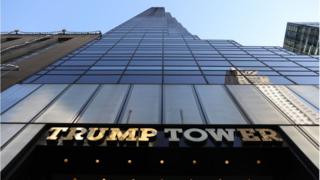Trump’s tower in Moscow that never was
The latest chapter of the Trump-Russia inquiry centres around the 100-storey building that almost was.
A report from Buzzfeed News claims President Donald Trump directed his ex-lawyer Michael Cohen to mislead Congress about plans for a Trump Tower in Moscow.
So what is this Moscow tower – and how did it come to the forefront of discussions around Mr Trump and Special Counsel Robert Mueller’s ongoing inquiry into alleged Russian meddling?
Did Donald Trump build anything in Moscow?
No, but not for a lack of trying. Mr Trump has discussed wanting a tower in the city for the last 30 years.
He envisioned “a large luxury hotel across the street from the Kremlin in partnership with the Soviet government” in his 1987 book Art of the Deal.
Mr Trump called Russia “one of the hottest places in the world for investment” in a 2007 deposition, the Washington Post reported.
“We will be in Moscow at some point,” he had added.
In 2013, following an eventful trip to Moscow for his Miss Universe Pageant, Mr Trump reiterated these plans, tweeting: “TRUMP TOWER-MOSCOW is next.”
The tower came up again in 2015 discussions between Trump Organization aides, led by Cohen, and Russian contacts.
But so far, all of the plans have fizzled out.
How is Michael Cohen involved?
Cohen, Mr Trump’s right hand man turned Mueller informant, first began meeting with Russian-born businessman Felix Sater in 2015.
The soon-to-be candidate Trump had Cohen spearhead renewed efforts towards a 100-storey Trump Tower Moscow.
According to a BuzzFeed report in November 2018, the Trump Organization planned to offer Russian President Vladimir Putin the $50m penthouse at the top, a claim that the president’s lawyer, Rudy Giuliani, called “pure garbage”.
Cohen fell afoul of the special counsel for lying to Congress at least three times about the timeline and extent of these plans.
He initially said the project dissolved in January 2016, that he “never considered” asking Mr Trump to visit Moscow for the project, “never agreed” to do so himself, and that he did not recall any Russian government response.
Cohen then admitted in a plea deal with Mr Mueller that he lied “to be consistent with” and “loyal” to Mr Trump and had indeed kept the Trump family appraised of the developments.
Now, it has become clear that negotiations over the tower continued through June 2016 – at which point Mr Trump was already the Republican presidential nominee.
Just how deeply was Trump involved?
Mr Trump has insisted he had no investments in Russia and the Moscow project was just one of the venues his organisation was pursuing during his presidential bid.
“There was a good chance I wouldn’t have won,” Mr Trump has told reporters. “And why should I lose lots of opportunities?”
But Thursday’s report claims Mr Trump received 10 personal updates from Cohen about the plans during a time when Mr Trump denied having any business ties to Russia.
Mr Trump “personally instructed” Cohen to lie in order to “obscure Trump’s involvement”, according to Buzzfeed, and Mr Mueller reportedly has substantial evidence of this.
Why is all this controversial?
There is no law barring a presidential candidate from exploring foreign business deals, though it is a rare situation.
It is, however, a federal crime for a president to direct a witness to lie to Congress.
This week, Mr Trump’s pick for attorney general William Barr confirmed during his hearings he certainly believes a president can be guilty of obstructing justice for doing so.
So if the claim that Mr Trump instructed Cohen to lie was found to be true, legal analysts say this would amount to obstruction of justice, and it would stoke calls for impeachment among the president’s critics.
Another issue the Moscow project raises is whether Mr Trump’s longstanding desire for the property has coloured his pro-Russia views.
If Mr Trump received updates about Cohen’s dealings with top Kremlin officials in a project that Mr Mueller’s team says could have made him “hundreds of millions of dollars”, the president’s calls for camaraderie with Russia may have served his personal interest instead of a patriotic one.
Source: Read Full Article



